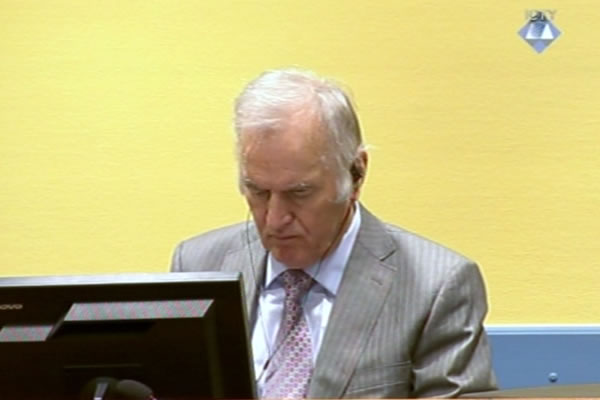Home
MLADIC’S TRIAL ADJOURNED TEMPORARILY
In the middle of the cross-examination of prosecution expert Robert Donia, the accused Ratko Mladic complained of dizziness. After a medical examination revealed his blood pressure was low, the trial was adjourned until Monday. Donia was talking about the causes of the war in BH
 Ratko Mladic in the courtroom
Ratko Mladic in the courtroom In the first part of the cross-examination, Ratko Mladic’s defense asked US historian Robert Donia questions about his first expert report, ‘Background, Policy and Strategy of the Siege of Sarajevo’. In the first part of the document, Donia analyzed the events that preceded the war in BH. Defense counsel Lukic tried to challenge his conclusions.
The witness claims that the JNA, ‘having suffered humiliation in Slovenia’, openly sided with Serbs in the war in Croatia. The defense counsel put it to Donia that the Yugoslav army did nothing but defend itself, trying to deblock the besieged barracks. Donia recalled that in some villages, such as in Kijevo, in Krajina, there were no barracks, yet they were attacked by the JNA and other Serb formations. Lukic argued that this was done in order to deblock the roads leading to major cities such as Split and Zadar.
The defense counsel suggested that the war in BH was caused by ‘the other side’: according to Lukic, the war started with the incidents in March 1992, when the Croatian paramilitaries attacked the Serb village of Sijekovac, and a local Muslim criminal killed Nikola Gardovic, a Serb guest at a wedding in Sarajevo. For Donia, things are much more complex: one must bear in mind that on the one hand, there was a movement for BH’s independence, and on the other, there were the opponents of this endeavor, led by the Serb Democratic Party and the JNA, who were much stronger in military terms. According to Donia, they initiated the war which started when the Serb units entered Bijeljina on 1 April 1992.
When the war started, Serbs withdrew to the area around Sarajevo, the defense contends. This is where they ‘owned’ the land. As a result, the city was divided along ethnic lines. The witness begged to differ, saying that the city ‘was divided by force’. According to him, the argument that the land around Sarajevo was the property of Serbs is ‘a myth’ used to justify the siege. The truth is that some of the settlements around the city were Serb, some were Muslim, and some had a mixed population. In the spring of 1992, they were all seized by Serbs.
Defense counsel Lukic put it to the witness that 5,500 Serbs were killed in Sarajevo during the war; no one represented their interests. The witness said there was a Serb party in the city; Mirko Pejanovic represented the Serb ethnic community in the BH Presidency. According to him, the figure of 5,500 Serb victims is ‘very likely an exaggeration’. In his view, several hundred people were killed. At any rate, he advised the defense counsel to talk to the organizations that work on determining the number of victims and the cause of their death during the war in BH.
Halfway through the second one-hour session, the trial was adjourned. When the judges returned to court, they were told that Ratko Mladic was not feeling well. His defense counsel said Mladic felt dizzy, while his right arm and leg felt numb. This made it impossible for him to follow the trial. The physicians who examined him during the break notified the judges that his blood pressure was low, as a result of weight loss. Since Mladic refused to waive his right to attend his trial, Robert Donia’s evidence will continue on Monday. Two protected prosecution witnesses will testify after him.
Linked Reports
- Case : Mladic
- 2013-08-22 DRINA RIVER WAS NOT TO BE THE BORDER
- 2013-08-21 ESCAPE FROM CERTAIN DEATH
- 2013-08-20 TERRAIN CLEAN-UP, NOT CRIME COVER-UP
- 2013-08-26 VIOLENCE AGAINST SARAJEVO A ‘PROPAGANDIST CARICATURE’
- 2013-08-27 RATKO MLADIC’S ‘INFLUENTIAL VOICE’
- 2013-08-28 JUSTIFYING THE SHELLING OF SARAJEVO
